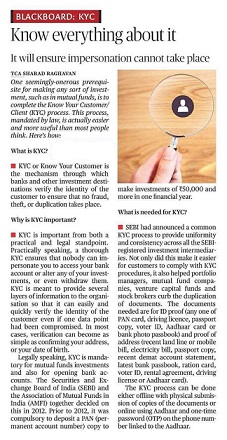Source: The Hindu
 Introduction
Introduction
KYC stands for Know Your Customer. KYC is one of the most important term in the online transaction market. KYC is a term commonly used for Customer Identification Process. For a person to open a Bank Account, one has to submit the documentary proofs. These documentary proofs will help to confirm the Nationality and Residence. KYC is also will help in establishing a safe and long term relationship with the bank.
 KYC
KYC
KYC - What is KYC?
KYC or Know Your Customer is the mechanism through which banks and other investment destinations verify the identity of the customer to ensure that no fraud, theft, or duplication takes place.
KYC- Importance of KYC:
- KYC is important from both a practical and legal standpoint. Practically speaking, a thorough KYC ensures that nobody can impersonate you to access your bank account or alter any of your investments, or even withdraw them. KYC is meant to provide several layers of information to the organization so that it can easily and quickly verify the identity of the customer even if one data point had been compromised. In most cases, verification can become as simple as confirming your address, or your date of birth.
- Legally speaking, KYC is mandatory for mutual funds investments and also for opening bank accounts. The Securities and Exchange Board of India (SEBI) and the Association of Mutual Funds in India (AMFI) together decided on this in 2012. Prior to 2012, it was compulsory to deposit a PAN (permanent account number) copy to make investments of Rs. 50,000 and more in one financial year.
- SEBI had announced a common KYC process to provide uniformity and consistency across all the SEBI-registered investment intermediaries. Not only did this make it easier for customers to comply with KYC procedures, it also helped portfolio managers, mutual fund companies, venture capital funds and stock brokers curb the duplication of documents.
- The documents needed are for ID proof (any one of PAN card, driving license, passport copy, voter ID, Aadhaar card or bank photo passbook) and proof of address (recent landline or mobile bill, electricity bill, passport copy, recent demat account statement, latest bank passbook, ration card, voter ID, rental agreement, driving license or Aadhaar card).
- The KYC process can be done either offline with the physical submission of copies of the documents or online using Aadhaar and one-time password (OTP) on the phone number linked to the Aadhaar.




